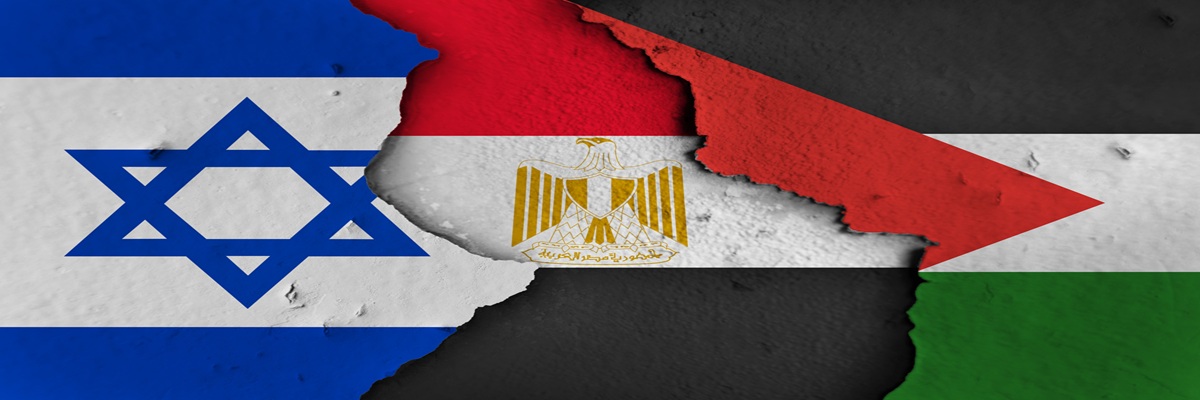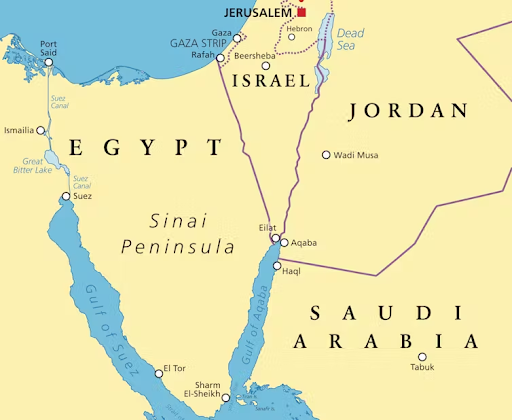Diplomacy
Egypt's war in Gaza: a delicate balancing act

Image Source : Shutterstock
Subscribe to our weekly newsletters for free
If you want to subscribe to World & New World Newsletter, please enter
your e-mail
Diplomacy

Image Source : Shutterstock
First Published in: Sep.02,2025
Sep.12, 2025
For several years, Egypt – which recently announced that Hamas had accepted a ceasefire proposal negotiated in Cairo – has been playing a mediating role in the conflict in Gaza. As the only Arab country sharing a border with the Palestinian enclave, Egypt pursues strategic objectives that combine security concerns and domestic constraints – goals that are under pressure from Israel's expansionist policy. In the absence of a diplomatic solution, the situation in Gaza could have unpredictable consequences for the regime of Abdel Fattah Al-Sisi, whose options, in the face of public opinion, remain limited to avoid the accusation of indifference and to mask its impotence against Tel Aviv.
On August 18th, the announcement of a ceasefire accepted by Hamas, negotiated in Cairo based on a U.S. plan, highlighted the mediating role played by the Egyptian authorities in the war waged by Israel in Gaza.
This role remains essential, even though Qatar's actions have often received more media attention due to the emirate's proximity to Hamas.
A key and historical role as a mediator
Without going back to the creation of the Palestine Liberation Organization (PLO) or the Egyptian-Israeli peace agreements of 1979, Cairo has long been an essential player in the Israeli-Palestinian conflict due to its negotiation capacity between Israel and the Palestinians. Hosni Mubarak's Egypt (1981-2011) played a major role in most agreements concluded between the PLO and Israel after Oslo (1993) and was active in maintaining a channel of discussion with Israel during the Second Intifada (2000-2005).
After Hamas's victory in the Palestinian legislative elections of 2006 and its takeover of Gaza in 2007, Egypt intervened in bilateral negotiations both between Hamas and Fatah and between Hamas and Israel during the conflicts of 2008-2009, 2012, 2014, and 2021, in which the victims were mostly civilians.
The rise to power of Abdel Fattah Al-Sisi in 2014, following the overthrow of President Mohamed Morsi (2013), who was from the Muslim Brotherhood, created tensions with Hamas, which is close to the Islamist movement. Adjustments were necessary, but Egyptian intelligence maintained a discreet connection with Hamas and continued to carry out mediation missions with Israel or with Mahmoud Abbas's Palestinian Authority.
Since October 7, 2023, alongside Qatar and the United States (the only actor able to pressure Israel), Egypt is once again at the heart of negotiations, whether they take place in Doha or Cairo. A first agreement under the sponsorship of the three states was reached in January 2025. Previously, in December 2024, Egypt had negotiated an agreement between Fatah and Hamas to establish an autonomous administration at the end of the war.
A red line against Israeli expansionism?
In recent days, in light of Israel's expansionist policy, Egypt has made numerous statements regarding the situation in Gaza. The authorities in Cairo have expressed support for the establishment of an international peacekeeping force mandated by the UN, while denying rumors that they had proposed a transfer of Hamas's weapons to Egypt.
In Rafah (Egypt), in an interview with CNN, Foreign Minister Badr Abdelatty reaffirmed the rejection of a massive relocation of Palestinians, which he described as a 'red line.'
Earlier, President Al-Sisi had crossed a rhetorical threshold by denouncing a 'war of famine and genocide' and reiterated his refusal of any relocation plan. Egypt is also supporting the South African complaint to the International Court of Justice for violation of the Genocide Convention, without joining the stakeholders.
These statements come in a dual context of a blockage of negotiations and an acceleration of Israeli operations, with Israeli territorial ambitions that could signify the end of any possibility for a two-state solution and a massive displacement of people outside of Palestine, particularly towards Egypt.
The ceasefire negotiated in Cairo by Egyptian and Qatari mediators largely echoed the plan of Donald Trump's special envoy, Steve Witkoff, and thus represents a real advancement compared to the situation in early June, when the United States, along with Israel, had rejected the proposal made by Hamas to implement a truce. An advancement that, however, has not resulted in a breakthrough: a week later, Israel has still not responded to the negotiators' proposal.
The announcement of the ceasefire accepted by Hamas comes as the Israeli security cabinet approved, on August 8, a plan to take control of Gaza and as the UN, after several warnings, declared a state of famine in the Gaza Strip. Various Egyptian statements also resonate with the vision of a 'Greater Israel' recently put forward by Benjamin Netanyahu, referring to the biblical borders of Israel that include territories currently belonging to Jordan, Lebanon, and Syria, as well as part of the Sinai Peninsula.
The idea of relocating the Palestinian population outside of Gaza is not new, although it has been rather marginal until now. Recently, Netanyahu has publicly considered relocating Gazans to Arab countries or Africa (negotiations in this regard have been mentioned several times).
The Sinai, a key security issue for Egypt
Egypt, which shares a 14-kilometer border with the Palestinian enclave, the "Philadelphian corridor," is also a security player because it plays a key role, almost literally, in the blockade imposed by Israel on the Gaza Strip (both in terms of its maintenance and/or its easing).
In this regard, Abdel Fattah Al-Sisi's Egypt is not spared from criticism that denounces its inaction while, on the other side of the border, the war waged by Israel increasingly resembles ethnic cleansing, if not genocide.
The grievances are numerous and particularly concern the blocking of supplies at the Rafah crossing into Palestinian territory, the security treatment reserved for Gaza refugees – about 100,000 Palestinians have sought refuge in Egypt since the beginning of the war, paying high fees to the Hala company, which specializes in the 'coordination' of the Rafah crossing – as well as the security management of pro-Gaza protests, both in Cairo and in Sinai. It should be noted that Egypt administered Gaza from 1948 to 1967, before the strip came under Israeli control. Since then, Cairo's stance towards Gaza has always been deeply influenced by the situation in Sinai, a large desert area where the border between Egypt and Gaza is located.
Occupied by Israel in 1967 following the Six-Day War (at the same time as the Gaza Strip), Sinai was recovered by Egypt in 1982. Underdeveloped territory with inadequate infrastructure, Sinai has been, for decades, a trafficking zone between Egypt, Israel, and Gaza.

As can be seen on this map, it is in the extreme northeast of the Sinai Peninsula that the border between Egypt and the Gaza Strip is located. Peter Hermes Furian/Shutterstock
After 2011, a local jihadist movement, which joined the Islamic State in 2014, thrived there before being gradually contained by the Egyptian army after a "dirty war" that resulted in several thousand casualties (more than 3,200 deaths among security forces, while the number of civilian casualties is unknown). Sisi proclaimed victory in 2023, with operations ending between 2019 and 2020.
For Cairo, the management of Gaza is primarily a security issue. It involves containing trafficking, preventing the infiltration of armed groups more radical than Hamas, the most active of which is the Islamic Jihad, and avoiding an influx of Palestinian refugees, due to its logistical inability to organize such reception. Beyond the logistical question, Egyptian leaders fear a situation that could turn into a de facto state. They have in mind the Lebanese and Jordanian precedents, where the settlement of Palestinian refugees led to the events of Black September in the Hashemite Kingdom and to the civil war in the Land of the Cedar.
This position is longstanding. As early as 2008, the forced entry of thousands of Palestinians into Sinai was perceived as a transgression of national sovereignty, a repetition of which must be avoided "at all costs."
Nevertheless, Egypt denies participating in the blockade or being inactive in the face of the tragedy experienced by the Palestinians. President Sisi himself responded to these accusations, reminding that it is Israel that has bombed the Rafah crossing multiple times and controls the Palestinian side of Rafah. Israel, which withdrew from Gaza in 2005, regained control of the Philadelphia corridor in May 2024. Egyptian media, echoing the government's talking points, emphasize the humanitarian convoys sent from Egypt: over 45,000 trucks, accounting for 70% of humanitarian aid, have reportedly supplied Gaza since October 2023 (noting that the crossings can only occur with Israel's agreement and under its security conditions).
Between external constraints and internal pressures
On the Palestinian issue, Egypt advocates for the establishment of a Palestinian state within the framework of a two-state solution. This is a historical positioning, defined by Anwar El-Sadat in his speech to the Knesset in November 1978.
It translates into diplomatic actions, but since 2008, each Israeli war in Gaza highlights the limited scope of Egyptian engagement. However, for Sisi, this engagement comes with domestic constraints. The desperate situation of Gazans resonates widely in Egypt as well as throughout the region and provokes a strong sense of solidarity.
Here too, the Egyptian government is caught in its contradictions. For many Egyptians, Hamas is not so much a terrorist movement as a resistance movement against Israel: indeed, even Cairo has not classified it as a terrorist organization, unlike the Egyptian Muslim Brotherhood.
On one hand, the Egyptian authorities repress any demonstration that they do not organize themselves and that could challenge the regime. There is a mistrust of the street that refers to the importance of mobilizations supporting Palestinians in the militant trajectory that led to the 2011 revolution. On the other hand, the president and the government must take into account public opinion’s sensitivity and show that they are not powerless. In this regard, accepting the relocation of Palestinians in Sinai would make them accomplices in the eyes of Egyptians.
In any case, Egypt's role seems hardly able to go beyond humanitarian aid and diplomatic negotiations. Peace with Israel remains a pillar of Egyptian foreign policy. Cairo will not jeopardize its bilateral relationship with Israel to the point of threatening to enter into armed conflict with it.
Not only for economic reasons, or because part of Egypt's gas supplies depend on Israel – even if these can represent a leverage. In many aspects, the alliance with Israel is crucial for Sisi: beyond the support that Netanyahu was able to provide him by pleading his case in Washington after the coup against Morsi (2013), the Hebrew state is an economic partner, but also a security partner in the fight against jihadist groups still present in the Sinai. While red lines are stated, no real threat has been made.
However, rumors from government sources had circulated in February 2024: they spoke of the threat of a suspension of the peace treaty in the event of an Israeli invasion of Rafah. Alas, Israeli troops have occupied the border area since May 2024 without Egypt reacting in any way other than verbally. It seems particularly unlikely that the Egyptian army could be mobilized to intervene outside of a UN framework and without Israel’s consent.
Diplomacy so as not to appear either indifferent or powerless?
It will be understood, therefore, that Egypt's recent statements are part of a long-term policy and do not indicate a change in direction. Israel's expansionist policy puts Egypt's strategic objectives under tension: the establishment of a Palestinian state as part of a two-state solution, the preservation of Egypt's sovereignty in Sinai and its security, and finally, the support of Egyptian public opinion.
While Israel responded to Cairo's announcement by mobilizing 60,000 reservists to carry out its plan to occupy Gaza, the question of the sustainability of this balancing act arises and exposes Cairo to reality. Alone, Sisi's regime can do nothing against Israel.
While it is unlikely that the Egyptian president will take the risk of opposing militarily, he seems destined to appear indifferent or powerless. A humiliation on the Gaza issue could be costly for the autocrat internally and have dramatic consequences for the region. Therefore, Egypt is left with only the diplomatic path to get out of the rut. First, negotiate a ceasefire and then find an alternative solution to the Israeli occupation of Gaza. The latter could require Egypt's return to the Gaza Strip. But is Egypt really ready to play its part in a solution for Gaza beyond diplomatic negotiations?
First published in :

Doctor in Sociology from Paris 1 Panthéon-Sorbonne University – Research Associate at Paris 1 Panthéon-Sorbonne University (UMR Development and Societies).
Unlock articles by signing up or logging in.
Become a member for unrestricted reading!